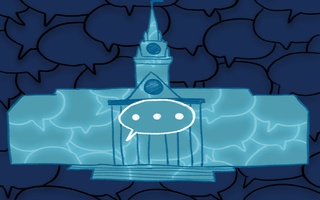Students’ free speech rights are constantly suppressed across American college campuses. Recently, a student sued Los Angeles Pierce College after he was prohibited from passing out pocket constitutions outside the college’s “free speech zone”, which confines speech activities to a small outdoor area.
Harvard is no exception; it has speech codes that clearly infringe upon students’ First Amendment rights. One example is Harvard’s racial harassment policy, which bars students from “using racial epithets, making racially derogatory remarks, and using racial stereotypes.” The wording used in this speech code is far too vague and therefore threatens students’ free speech rights.
The First Amendment of the U.S. Constitution states, “Congress shall make no law […] abridging the freedom of speech, or of the press.” Harvard is a private institution and is not legally bound by the First Amendment. However, Harvard is considered to be an institution that encourages America’s best and brightest to pursue truth. In order to do so effectively, Harvard must foster diversity in intellectual thought and therefore respect students’ right to free speech, regardless of how different and controversial it may be.
However, Harvard was given a “red light” categorization by the Foundation for Individual Rights in Education for having at least one policy that obstructs freedom of speech. FIRE is a non-profit organization that “defends and sustains individual rights at America’s colleges and universities.” Harvard’s “red light” policy defines racial harassment “as actions on the part of an individual or group that demean or abuse another individual or group because of racial or ethnic background. Such actions may include, but are not restricted to, using racial epithets, making racially derogatory remarks, and using racial stereotypes.” We must keep in mind that what is offensive to one person may not be offensive to another.
For speech to not be protected by the U.S. Constitution, it must follow the Davis v. Monroe County Board of Education ruling, which states that speech must be “so severe, pervasive, and objectively offensive, and that so undermines and detracts from the victims’ educational experience, that the victims are effectively denied equal access to an institution’s resources and opportunities.” Thus, a term must fall under the pattern of “so severe, pervasive, and objectively offensive,” for it to not be recognized as protected speech.
We need to reform Harvard’s policies. If we do not, we might experience problems that have already surfaced at other universities. For example, a chalk message, “Trump 2016,” was written on Emory University’s sidewalks. Many students found this offensive and reported it as “hate speech” to the administrators. If Harvard does not reform its speech codes, it could potentially have an incident where someone’s free speech rights are seriously encroached upon.
As a solution, Laura Beltz from FIRE suggested the following policy to replace Harvard’s current racial harassment code: “The College defines racial harassment as actions on the part of an individual or group that demean or abuse another individual or group because of racial or ethnic background, "and that are so severe, pervasive, and objectively offensive that the individual or group is effectively denied equal access to the College’s resources and opportunities." Such actions may include, but are not restricted to, using racial epithets, making racially derogatory remarks, and using racial stereotypes, "when they are part of a pattern of conduct that rises to the level of the standard set forth above.” The replacement language is in line with the First Amendment and also emphasizes the language from the Davis ruling.
Why must we embrace free speech? Colleges and universities afford students the opportunity to voluntarily exchange ideas that help them to mature intellectually and prepare for life after graduation. That is why it is crucial for campus speech codes to reflect the First Amendment. If administrators continue to coddle students and impose unnecessary bans that impede the free exchange of thoughts and ideas, how can we expect them to create value in society? As Erika Christakis, a former Yale College faculty member, stated in her open letter, “Free speech and the ability to tolerate offense are the hallmarks of a free and open society.”
Natalie Bao Tram Le is a masters student at the Harvard Extension School and a member of Students For Liberty.
Read more in Opinion
This We’ll DefendRecommended Articles
-
 For Faust, Free Speech Entails Accountability
For Faust, Free Speech Entails Accountability -
Safe Spaces and Free SpeechWhile the University of Chicago may have overstepped in issuing a blanket condemnation of safe spaces and content warnings, its letter was also a reaction to the suppression of speech that has every right to be heard on university campuses everywhere.
-
Modern McCarthyismThe problem with today is not that speech isn’t free, but rather that individuals on both sides have tried to use extreme measures to insult, silence, and discredit each other.
-
 Free Speech, Not Free Rein
Free Speech, Not Free Rein -
 Charles Murray, Controversial Alum, Set to Speak at Harvard
Charles Murray, Controversial Alum, Set to Speak at Harvard













